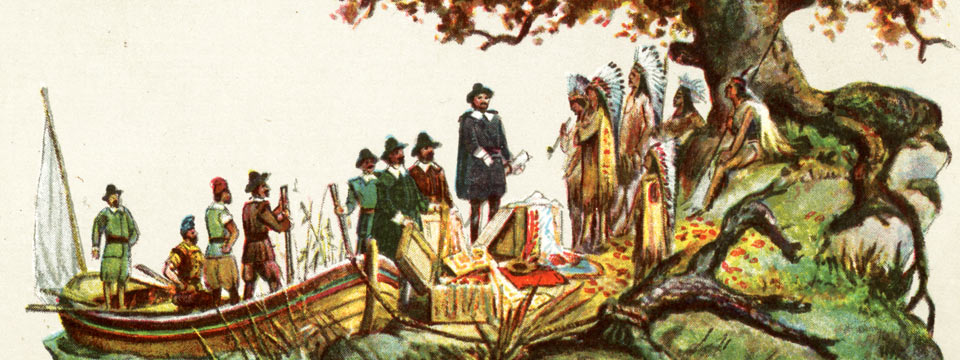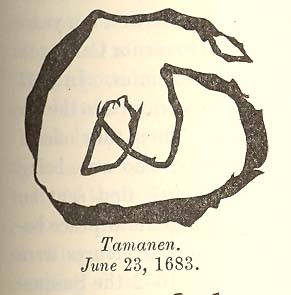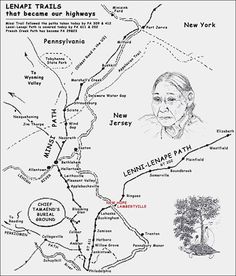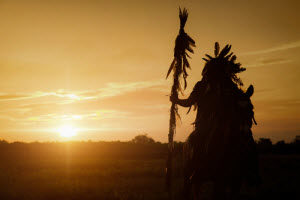
How Scheyichbi Really Became New Jersey
By Frank R. Stockton
Originally published in 1896
This Web version, edited by GET NJ, COPYRIGHT 2003
A POINT in the history of New Jersey, more important in a moral point of view than that of its European ownership, was that of the purchase of the lands from the first and true owners, the Indians. As has been said, Berkeley and Carteret issued an injunction that the settlers should purchase their land from the tribes which had lived upon them. This system was subsequently carried out until every foot of the land of the whole State was bought and paid for, – the first transactions of the kind, having taken place several years before Penn’s treaty with the Indians in Pennsylvania.

Up to the time when the country finally passed into the hands of the English, the Indians had resisted the attempts of the whites to settle among them; but now, finding that they were to be fairly dealt with, a better feeling arose, and the red men were content to dwell with the whites as friends and neighbors. Of course, all the settlers did not promptly pay for their lands, and there were some minor disputes from this cause; but in general the whites regularly purchased the land upon which they intended to make their homes, and in time all were obliged to do so. As may be supposed, very large prices were not paid for these lands; but the transactions were strictly honorable, because the parties on each side gave what they had, and all were satisfied with what they got.
The payments for land frequently consisted partly of ready-made coats, kettles, and in some cases of jew’s-harps. Tracts of land large enough for a town were sometimes sold for a barrel of cider. Now, this might appear rather a hard bargain for the Indians; but it must be considered that they had more land than they wanted, and no ready-made coats, or kettles, or jew’s-harps, or cider.
But it was not to be expected that the Indians would always be satisfied with their treatment; and in fact they had a good many grievances. As has been said, a settler sometimes established himself on a good piece of land without consulting the Indians of the neighborhood, or offering them payment, and in such cases there would be remonstrances from the red men. Then, again, the whites could not always understand the nature of Indian bargains. A man would buy a piece of land, and think that he owned not only the ground, but all that grew upon it, all that flew in the air above it, and everything that swam in its waters ; and when the Indians, after having received payment for the farm, came there to hunt and fish, and strip the bark off the trees, the purchaser was apt to object.
A notable difficulty of this kind occurred on Sandy Hook, where a man named Hartshorne had bought a tract of land from the Indians, and afterwards found, that, according to their ideas, he had no exclusive right to the fish, game, and timber of his new purchase; and he was especially made to understand that he had not bought the wild plums. This matter of the ownership of the plums afterwards became a source of considerable trouble, and was settled by Hartshorne paying to the chief of the neighboring tribe the sum of thirteen shillings, by which he acquired the entire right to the plums and all the other things on his land.
The Indians had also a grievance of a different kind. There was a conference held in Burlington, between the Indians and the whites, in 1678, which was convened on account of a complaint by the Indians that the English, in selling them some ready-made coats, had also sold them the smallpox. The temper of the Indians may be shown by one of their speeches on this occasion. A leading chief declared: “We are willing to have a broad path for you and us to walk in ; and if an Indian is asleep in this path, the Englishman shall pass by him and do him no harm ; and if an Englishman is asleep in the path, the Indian shall pass him by and say, ‘He is an Englishman; he is asleep; let him alone; he loves to sleep !’ It shall be a plain path. There must not be in this path a stump to hurt our feet. And as for the smallpox, it was once in my grandfather’s time, and it could not he the English that could send it to us then, there being no English in the country. And it was once in my father’s time, they could not send it to us then, neither. And now it is in my time, I do not believe that they have sent it to us now. I do believe it is the man above who has sent it to us.” Soon after this, the two parties exchanged presents, and went away satisfied.
For many years after this, there seem to have been few or no troubles between the Indians and the settlers of New Jersey. But matters changed about the middle of the next century; and when the Indian wars began in Pennsylvania, the red men of New Jersey showed symptoms of hostility to the whites. Matters grew worse and worse; and the Indians began to murder families, burn buildings, and carry away prisoners.
This state of affairs grew so alarming that the Legislature took the matter in hand. They appointed commissioners to examine into the treatment of the Indians, and see if there were any good cause for their sudden enmity; and, after a conference with some of the chiefs, a bill was passed by the Legislature to put an end to a good many of the impositions of which the Indians complained. Among these was a habit of the whites of giving the Indians spirits, and then making bargains with them when they were not at all in a condition to do business of that kind. The Indians also complained of the practice of trapping deer, thus decreasing the game in the forests, and the occupation of land, without payment, by the settlers who were continually coming into the country.
Another bill was passed appropriating £1600 to buy from the Indians the entire right to all the lands which they yet held in New Jersey. But as there was no desire to banish the Indians from their native land, one half of this sum was reserved as payment for a large tract of land, or reservation, which should be their home, and on which no white man would have any right to settle, whether he was willing to buy the land or not. When this had been done, it was necessary to submit the matter to the Indians; and a council was called at Burlington, at which were present the governor of the Province, and. some of the most prominent Indian chiefs.

At this conference there was a notable exhibition of Indian etiquette. The governor had called the Minisinks, a tribe of the Delawares, to meet him; and they had informed the Mingoians, who, with some other northern tribes, were then gathered together at the grand council fire at the forks of the Delaware, where is now Easton. This was done, because at that time the Mingoians considered themselves superior to the Delawares, from whom proper respect was due.
One of the chiefs from the council fire was sent down to represent the Mingoians. After some speeches were made, he told the white governor that the Minisinks, being Delawares, were women, and were not able of themselves to make treaties, therefore he had come down to look into the matter. As his people were then holding a grand council fire at the forks of the Delaware, they did not wish to put it out and build another council fire on this side of the Delaware. The reason which he gave for this was figurative and Indian-like.
He stated that the river roared and thundered, and made a great deal of noise; and, if the council were held on this side, the distant Indian nations who dwelt to the west of the Delaware could not hear what was said at the council, and therefore it would be unfair to them to hold it on this side of the river. He concluded with a cordial invitation to the governor and his party to meet the Indians at their own council fire.
About a month afterward, the governor, with some members of the Legislature, and other white people from New Jersey and Pennsylvania, met over five hundred Indians at the forks of the Delaware in grand council. Some of the speeches on this occasion were very interesting. A chief of the United Nations, speaking for the Delawares, who, having made themselves women by becoming peacemakers, had no right to speak for themselves, addressed the council as follows:-
“Brethren, we now remove the hatchet out of your heads, that was struck into it by our cousins the Delawares. It was a French hatchet they unfortunately made use of, by the instigation of the French. We take it out of your heads, and bury it underground, where it shall always rest, and never be taken up again. Our cousins the Delawares have assured us they will never think of war against their brethren the English any more, but will employ their thoughts about peace and cultivating friendship with them, and never suffer enmity against them to enter into their minds again.”
Another chief said : “Brethren, I speak in behalf of the younger nations, – those who are confederated with the Six Nations, the Cayugas, Oneidas, Tuscaroras, Tutaloes, Nanticokes, and Conoys. A road has been made from our country to this council fire, that we might treat about. friendship; and as we came down the road, we saw, that, by some misfortune or other, blood has lately been spilt on it. Now, we make the road wider and clearer. We take the blood away out of it, and likewise out of the council chamber, which nay have been stained. We wash it all away, and desire it may not be seen any more, and we take the ratchet out of your heads.”
The governor of New Jersey also addressed this council, particularly urging them to require the Indians who had taken away prisoners to return these unfortunate people to their homes. In answer to this, one of the great chiefs of the United Nations made a speech to the Minisinks and the Delawares, in which he gave them a good scolding for not having returned these prisoners before ; for it seemed that they had promised to do so.
The council continued several days; and the Minisinks promised faithfully that they would search all the towns in their territory for prisoners, and return them to their own people. This matter having been settled, Governor Bernard made a formal proposition to buy all the lands which the Indians still retained in New Jersey; and, after a good deal of consultation, the chiefs of the United Nations advised the Minisinks and Delawares to accept the terms which were offered. After much talk, it was done, the necessary papers were signed, and the State of New Jersey was formally bought from its Indian owners.
After this great matter had been settled, the tract of land which was to be set apart for the occupation of the Indians of the State, south of the Raritan River, in Burlington County, was purchased. It consisted of three thousand acres, which reached to the seacoast. There was plenty of fishing on it, and there were wild lands and forests, in which game abounded. Here the Indians could live as they pleased after their old-fashioned fashions, and never need fear disturbance by white men. Here they removed, and here they did live, apparently perfectly satisfied; and after this there were no further Indian troubles in New Jersey.

The Indians on this reservation came to be known as the Edge-Pillocks, and in course of time considerable civilization crept in among them. It is a proof of this, that one of them, who took the name of Stephen Calvin, kept a school, and that his son Bartholomew went to Princeton College, and afterwards taught school. It is said that in his school there were as many white scholars as Indians.
In 1801 these Edge-Pillock Indians were invited by the Mohicans of New York to leave their New Jersey home and come and live with them. In their invitation the Mohicans said they would like them “to pack up your mat and come and eat out of our dish, which is large enough for all, and our necks are stretched in looking toward the fireside of our grandfather till they are as long as cranes.”
The Edge-Pillocks sold their reservation, had the money invested for them in United States stocks, and went to join the Mohicans. After that, both tribes decided to buy land in Michigan, and the Edge-Pillocks disposed of their stocks to pay for their share.
But our New Jersey Indians did not fare well in the West. Their fortunes did not prosper, and they grew poorer and poorer, until in 1832 their numbers decreased to about forty. Feeling the pressure of poverty, their Indian disposition suggested to them a remedy. They remembered, that, although they had sold their reservation, nothing had been said in the deeds concerning the game and the fish on the property; and they chose to consider that these still belonged to them. They therefore sent Bartholomew Calvin, who was now their oldest chief, to New Jersey to ask the Legislature to buy these remaining rights. The Legislature promptly agreed to do this, and appropriated two thousand dollars, which was the sum Bartholomew named, to buy of the Indians all their remaining rights of every kind in New Jersey.
This act may be considered as one of kindness and charity to the former owners of the land, rather than as an act of justice, because there is no doubt, that when the Indians sold the reservation, and invested the proceeds, they intended to sell every deer, fish, bird, and mosquito on the whole tract. But it is an honor to the Legislature of that day that it was willing to make happy the last days of the New Jersey Indians by this act. That the Indians appreciated what had been done, may be seen from the following extract from a letter from Bartholomew Calvin:-
“Upon this parting occasion I feel it to be an incumbent duty to bear the feeble tribute of my praise to the high-toned justice of this State in dealing with the aboriginal inhabitants. Not a drop of our blood have you spilled in battle, not an acre of our land have you taken but by our consent. These facts speak for themselves, and need no comment. They place the character of New Jersey in bold relief, –a bright example to those States within whose territorial limits our brethren still remain. Nothing save benisons can fall upon her from the lips of a Lenni-Lenape.”
But the love of their old home did not die out entirely in the hearts of all the Edge-Pillock Indians, who emigrated, first to New York, and then to Michigan. There was one Indian brave and his squaw, who, after living at Oneida for some time, began to long again for the old hunting ground in New Jersey; and, before the rest of their tribe went West, these two came back to Burlington County, and established themselves in a little house near Mount Holly. Here these two Indians lived for about twenty years; and when they died, they left a daughter, a tall powerful woman, known in the neighborhood as “Indian Ann,” who for many years occupied the position of the last of the Lenni-Lenape in New Jersey.
She lived to be more than ninety years old ; and her long straight black hair, her copper-colored skin, her bright eyes, gave the people of the neighborhood a good idea of what sort of people used to. inhabit this country before their ancestors came over the sea. She had many true Indian characteristics, and loved to work in the open air better than to attend to domestic matters in the house. Even when she was very old, she would go into the woods and cut down trees as if she had been a man. She did not die until December, 1894; and then the people who had known her so long gathered together at her funeral, and buried the last of the Indians of New Jersey.
Thus Scheyichbi, the land of the Indians, became truly and honestly New Jersey, the land of the English settlers; and to this State belongs the honor of having been the first in the Union in which the settlers purchased and paid. for the lands on which they settled, and in which the aboriginal owners were so fairly treated that every foot of the soil not purchased of them by individuals was bought and paid for by the government of the State.
Authorities:
“History of New Jersey.” S. Smith.
“History of New Jersey.” I. Mulford.
“History of New Jersey.” T. F. Gordon.












